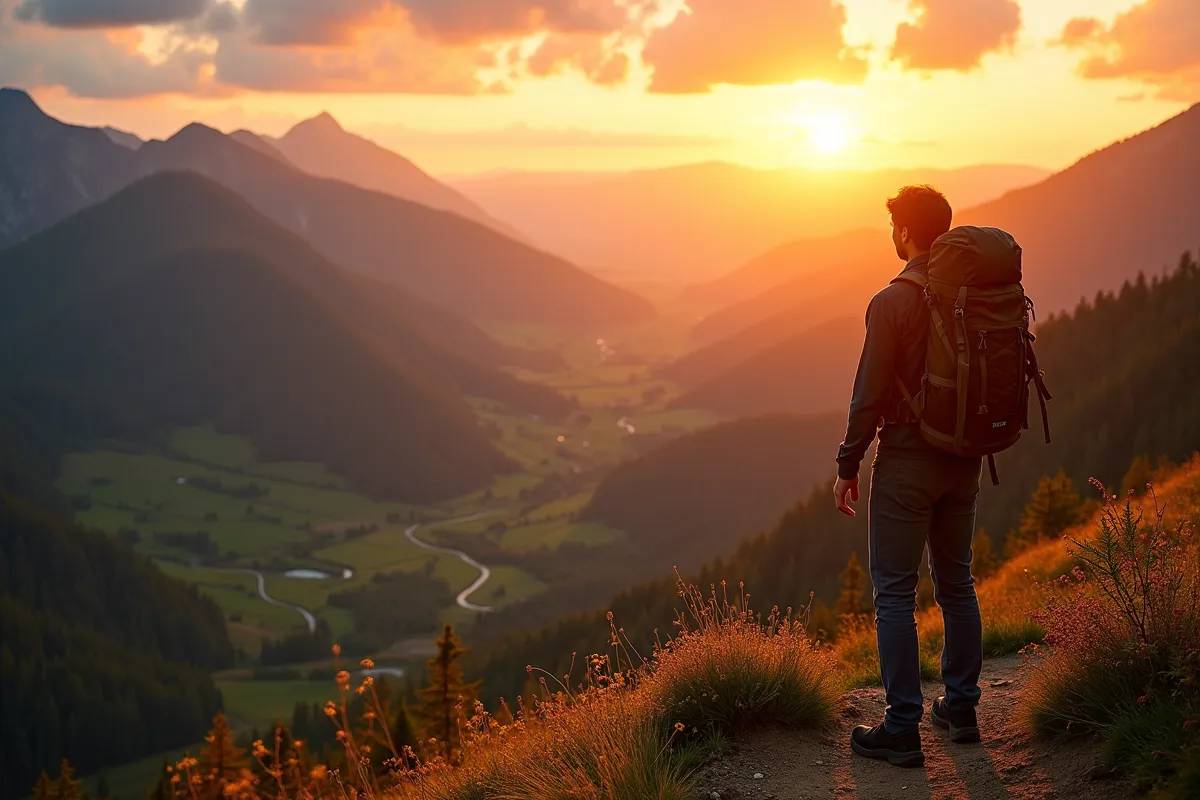Embarking on a multi-day trek is more than just an adventure—it’s an incredible journey that challenges both your mind and body, all while unveiling some of nature’s most breathtaking vistas.
Whether you’re an experienced hiker or a curious novice, the right training strategies can be your secret weapon in transforming this demanding endeavor into an unforgettable experience.
Picture yourself standing atop a mountain, feeling the rush of the wind and the joy of accomplishment; this is the reward that awaits with the proper preparation.
So, buckle up your boots and get ready to dive into essential training tips that will have you conquering trails with confidence and a wide smile.
Getting Ready for the Big Adventure
Heading out on a multi-day trek is more than just packing a bag and hitting the trail. I approach my adventure by getting the groundwork right and being aware of what my body will need to endure the journey.
Laying the Groundwork for a Multi-Day Trek
Before sweating it out on the training ground, I kick things off by planning and dreaming up the trek. For me, it means digging into trail info and getting the lowdown on the environment. I’m talking about weather, changes in height as I climb, and the stuff I’ll need logistically.
I put a lot of energy into scoping out sound advice on the best paths and spots to explore, which really makes my experience rock. A must-do for me is crafting a list of the essentials, making sure I don’t end up in a pickle because I forgot something vital.
Getting a Grip on What My Body’s in For
It’s just as key to know the kind of workout my body’s signing up for on a multi-day trek. This journey means testing my stamina, building my muscles, and keeping my body bendy. To give myself a clear picture, I often break down what a day on the trail might look like, including hiking, lugging a backpack, and tackling bumpy paths.
Here’s a basic rundown of the energy required for a multi-day trek:
| Trail Task | Calories Burned per Hour |
|---|---|
| Hiking at a Steady Rate | 430 – 480 |
| Climbing Steep Hills | 480 – 600 |
| Backpack Hauling | 450 – 600 |
| Setting Up Camp | 280 – 350 |
Knowing this lets me tweak my workout plan properly. For example, if I know there’s a lot of uphill trekking ahead, it’s hill drills for me. Plus, I brush up on my adventure survival smarts to handle any curveballs.
The journey kicks off with serious prep work. By getting the basics right and knowing what my body’s up for, I’m all set to soak in the thrills of the adventure.
Building Endurance
Getting ready for a multi-day trek means I gotta beef up my endurance—a must for sticking it out on those long trails without running out of steam. So, here’s the game plan: it’s all about mixing cardio workouts with some strength training to cover all the bases.
Cardiovascular Training
Heart-pumping fitness is where it’s at if I wanna hike for ages without crashing. Got a bunch of cardio exercises that do wonders for my ticker and lungs, making the tough stuff a bit more manageable.
| Exercise Type | Time per Session | Times per Week |
|---|---|---|
| Running | 30-60 minutes | 3-4 times |
| Cycling | 45-90 minutes | 2-3 times |
| Swimming | 30-60 minutes | 2-3 times |
| Hiking | 1-5 hours | 1-2 times |
I keep upping the ante with these cardio moves—challenge is the name of the game. Toss in some interval training, and it’s like you’re prepping on the real trek—minus the blisters. Wanna dive deeper into the wild side? Check out our piece on how to start adventure traveling.
Strength and Conditioning Workouts
Cardio ain’t cutting it alone, so I mix in some strength stuff to keep my muscles and balance in check. Target the big guns, ’cause lugging around a heavy backpack and stumbling over rocks requires strong, dependable muscles.
| Exercise Type | Sets & Reps | Times per Week |
|---|---|---|
| Squats | 3 sets of 10-15 | 2-3 times |
| Lunges | 3 sets of 10-15 (each leg) | 2-3 times |
| Planks | 3 sets of 30-60 sec | 2-3 times |
| Push-ups | 3 sets of 8-12 | 2-3 times |
Sneaking in exercises that remind me of trekking moves, like step-ups or carrying weight, is super handy. Not only pumps up my muscles but also gets me trekking-ready for whatever path I set foot on. Want the real grit on must-have skills? Read up on our piece about adventure travel survival skills.
Mixing cardio with muscle power gives me a rock-solid prep for those soul-stirring treks. The plan’s all set, and with these steps in my routine, I’m ready to conquer any adventure knocking at my door.
Hiking-Specific Training
Getting ready for a multi-day hike can feel like preparing for a marathon where the finish line is a staggering view. You gotta focus on the right kind of training, or else you’ll be dragging behind, cursing every pebble. Today, I’m giving you the lowdown on two key parts of my hiking prep: hitting the trails and climbing like I’m training for Everest.
Trail Walking and Hiking
Trail walking and hiking? They’re my bread and butter when gearing up for the big trek. Stomping around on the actual paths is the real deal that gets me used to the wild stuff I’ll face on my journey. How do I make it snappy? I hit up both local tracks and mix them up with tricky terrains to get those endurance levels popping like corn in a hot pan.
And here’s what my typical week could look like:
| Day | Activity | Duration |
|---|---|---|
| Monday | Local Trail Walk | 1 hour |
| Wednesday | Moderate Hike | 2 hours |
| Friday | Fast-paced Trail Walking | 1.5 hours |
| Saturday | Long Hike (Varied Terrain) | 4-6 hours |
Ramping up my stamina with longer hikes is key, while I give my legs the bootcamp they need for those upcoming marathon days. Paying mind to the ups and downs in elevation mimics the real mountains I’ll be climbing, making sure my legs don’t give me the cold shoulder halfway through.
Hill and Stair Climbing
Hill and stair climbing? Gotta say they’re like spinach for Popeye. Being able to tackle relentless hills and steep stairs leaves my legs stronger than a barrel of oats. Plus, it gets my lungs working so I’m not gasping like a fish out of water during the uphill battle.
Here’s how I roll with these workouts:
| Workout Type | Duration | Intensity Level |
|---|---|---|
| Hill Repeats | 30 minutes | High |
| Stair Climbing (Steep Stairs) | 20 minutes | Moderate to High |
Hill repeats are my secret weapon, running or walking up a hill till my legs scream “Uncle!” Perfect for building speed and leg power. Stair climbing? It’s like virtual reality for hiking. I pace myself so I keep going strong without hitting that dreaded wall of exhaustion too early.
Mashing together trail walking with hill and stair stuff gives me a solid prep game for my trek. And hey, if you want more hot tips on getting ready for adventure travel, check out our handy guide. Making the process fun helps me muster the skills and guts I need to face the wild unknown.
Gear Up for Success
Ready for an epic multi-day trek? It’s more than just about clocking hike hours; you’ve gotta have the right stuff to make it safe and fun. Here, I’ll spill about the gear you need and how to pack smartly.
Choosing the Right Gear
When I’m picking my gear, I look for things that are comfy, tough, and practical. Here’s my list of must-haves:
| Gear Type | What to Check Out |
|---|---|
| Backpack | Should be lightweight, have comfy straps, and a place for water |
| Tent | Should be lightweight, have comfy straps, and have a place for water |
| Sleeping Bag | Aim for one with the right warmth for where you’re headed |
| Hiking Boots | Find ones that are comfy, grip well, and don’t let water in |
| Clothing | Opt for sweat-busting stuff and layers to stay cozy or cool |
It’s all about quality over quantity when picking stuff. Spend a bit more on great gear here that’ll totally level up your trek. I always peek at reviews and go with the pro advice.
Packing Smart and Light
Nailing the packing game means just taking along what you’ll actually need. Pros say to use a “layering” method, which is a fancy way of saying pack stuff in the order you’ll need it and how often.
Here’s how I pack up:
| Item Category | Sample Gear |
|---|---|
| Clothing | Basics, warm stuff, rain shell |
| Cooking Gear | Little stove, tiny pots |
| Food Supplies | Quick-cook meals, snack bars |
| Navigation Gear | Map, old-school compass, maybe GPS |
| First Aid Kit | Essentials for oopsies |
I try to keep my backpack not weighing me down, aiming for it to be less than 20% of my weight. Need item ideas? Peep my packing list here.
Having the right gear means I can dive into the adventure without hassle. With good stuff and smart packing, the trip is all about the experience, not the excess luggage. If trekking fires you up, my beginner’s guide might be your thing.
Nutrition and Hydration
Getting ready for a multi-day trek isn’t just about flexing at the gym; it’s about the chow and liquids too. Take it from me—keeping my body fueled and hydrated makes all the difference on the trail, so here’s what I’ve found works like a charm.
Fueling Your Body
Stuffing your face with the right food keeps you buzzing with energy and in tip-top shape during a trek. We’re talking carbs, proteins, and fats here—just a good mix to keep everything ticking along.
| What’s In It | Why It’s Good For You | Where To Get It |
|---|---|---|
| Carbs | Quick energy for all-day slogging | Whole grains, fruits, veggies |
| Protein | Helps fix those worn-out muscles | Lean meats, beans, nuts |
| Fats | Keeps you going when you’re flagging | Nut butters, avocados, oils |
Start the day right with meals loaded with complex carbs so your energy tank is full. Handy snacks like trail mix, energy bars, and dried fruits are awesome for when you need that quick pick-me-up. For more tricks on packing eats like a pro, check out our adventure travel packing list.
Hydration Strategies
Knocking back enough water is just as important as the grub. Without it, you might find yourself dragging your feet and doing a good impersonation of a raisin.
| Water Game Plan | How Hard You’re Pushing | Daily Drink-O-Meter |
|---|---|---|
| Taking It Easy | Gentle hiking | 2 – 3 liters (68 – 102 oz) |
| Going All Out | Hard-core trekking | 3 – 4 liters (102 – 135 oz) |
Always have a trusty refillable water bottle or hydration bladder on hand. Sip some water before setting off, keep it up along the way, and don’t forget afterward. Electrolyte drinks or tablets come in handy for topping up essentials, especially when it’s roasting out or the going gets tough. For more nuggets of knowledge, swing by our guide on the extreme sports bucket list.
Being smart about what you eat and drink not only keeps you in the game but also cranks up the fun while you’re out there. Whether I’m tackling gnarly trails or soaking up the views, keeping fueled right really makes the difference.
Mental Preparation
Getting psyched up can be just as crucial as breaking into your hiking boots when you’re about to tackle a multi-day trek. I’ve figured out that a strong mindset and a bit of mental grit can really make that time in the great outdoors shine.
Mindset and Motivation
Before I strap on the backpack, I like to ponder why I’m setting off on this escapade in the first place. Knowing what drives me keeps my spirits high, even when my feet are screaming. I like to daydream about those jaw-dropping vistas or that sweet feeling of “I did it!” at the end. Through my wanderings, I’ve found these little tricks to beef up my brainpower:
| Trick | How It Helps |
|---|---|
| Daydreaming | Imagining the fun bits and brag-right moments. |
| Pep Talks | Reminding myself I’m tougher than I think. |
| Tiny Targets | Making bite-sized goals to aim for. |
Staying in the zone and pumped during those killer hikes isn’t always easy. Setting baby goals, like aiming for that tree over there or hitting pause after X miles, keeps the trek from feeling like Mount Everest—even if it kinda is.
Coping with Challenges on the Trail
No two treks dish out the same hurdles. From rocky paths to “Did the weather forecast just lie?” moments, having a game plan keeps things from going off the rails. Here’s my 411 on battling those bumps in the road:
| Trouble | Game Plan |
|---|---|
| Worn Out | Break time, hydrate, munch something with kick. |
| Stormy Skies | Layer up and slap on a smile! |
| Break time, hydrate, munch something with a kick. | Whip out the map or GPS, and ask other adventurers when in doubt. |
Rolling with the punches is a must. Sometimes the plan derails, but leaning into the chaos can turn a hiccup into the highlight of the trek.
Before jumping into my next odyssey, I dive into stuff that sharpens my skills, like picking up cool survival hacks or scouting awesome travel spots. The more I get my head in the game, the more ready I am to face the trail.
Safety First
When I’m gearing up for a multi-day trek, keeping myself safe and sound is the top thing on my mind. This part is all about being ready for emergencies and knowing when it’s time to chill out and recharge.
Emergency Preparedness
Being ready for curveballs on the trail is non-negotiable for me. Here’s my go-to checklist of must-haves:
| Essential Item | Purpose |
|---|---|
| First Aid Kit | Handle minor scrapes and sniffles |
| Map and Compass | Keep me on track and prevent wandering off course |
| Multi-tool or Knife | Tackle whatever tasks pop up |
| Whistle | Holler for help if disaster strikes |
| Emergency Blanket | Stay toasty warm when it’s freezing out |
| Fire Starter | Get a fire going when I need it most |
| Extra Food and Water | Keep me fueled up if I end up stuck |
Besides lugging these essentials around, I always let someone else know my wanderer’s plan and when I expect to be back. Getting the basics down in survival skills is also a lifesaver, literally. For extra tips, swing by our article on adventure travel survival skills.
Knowing When to Rest and Recover
I’m all ears when it comes to what my body’s saying during a trek. If I start feeling beat, parched, or just plain iffy, it’s nature’s way of telling me to slow down. Here’s when I hit pause:
| Sign | Action |
|---|---|
| Fatigue | Find a cozy spot and recharge my batteries |
| Thirst | Chug some water; hydration is key |
| Sore Muscles | A good stretch works wonders |
| Dizziness or Nausea | Stop in my tracks, check how I’m doing; take a breather if it’s needed |
Taking a breather every now and again helps keep injuries at bay and lets me soak up the jaw-dropping views. I’m usually keen on snagging a 5-10 minute break every hour or so, though it depends on how tough the path is. This swap between pushing forward and kicking back is a big help when gearing up for a longer trek.
In the end, playing it safe comes down to gearing up right, listening to my body’s hints, and making smart choices while taking in nature’s wonders.
Wrapping Up the Adventure
Embarking on a multi-day trek is like diving into a whirlpool of excitement, challenge, and personal growth. From packing your trail mix to readying your mind for those unexpected curveballs, every step is a story waiting to be told.
Remember, the heart of any grand adventure lies in being well-prepared, staying safe, and enjoying every twist and turn. Whether you’re tackling a rugged landscape or simply soaking up the serenity, let each stride be a reminder of the incredible journey you’re on.
Keep pushing limits, but always trust your gut and relish the ride. Until the next trail beckons, keep those boots ready and your spirit wild!




















